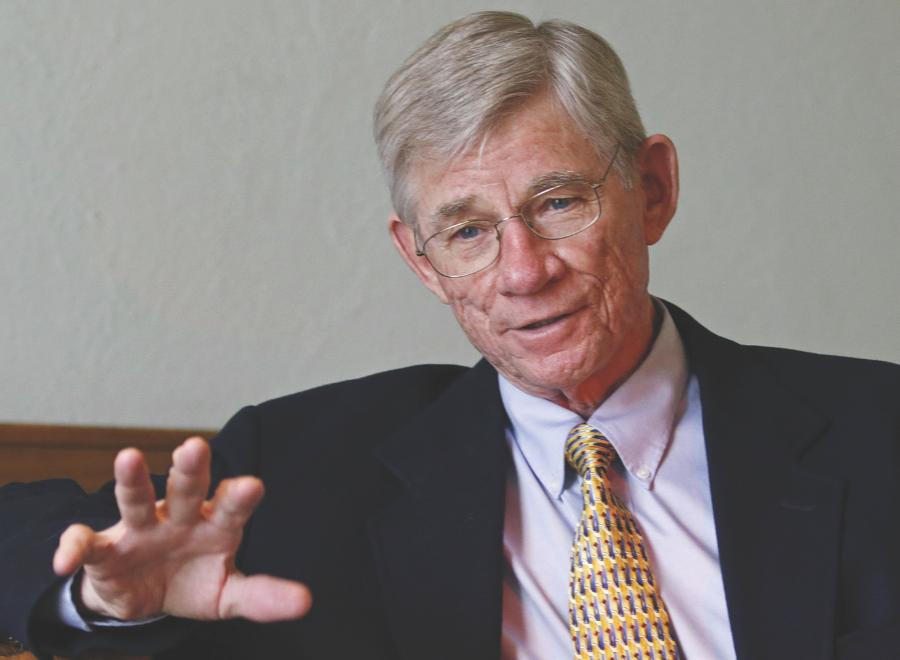Tex Sample, author of 12 books, spoke with Ken Gallinger at Trinity United in Peterborough, Ont.
Ken Gallinger: Where does your passion for blue-collar folks come from?
Tex Sample: I was raised in a working-class home. We got into the lower middle class when Daddy worked as a sheet-metal worker during World War II. He was able to buy a small cab stand with four cars. I realized very young, when I went to a demonstration against the old segregationist George Wallace, that a lot of the people there were working class, my people. And I said to myself, “You don’t even know the people you came from.” When I went to university, I was surrounded by rich, smart kids from the north, and I was scared to death. I realized I was different — my way of talking, my southern accent, the way I tell stories. I was raised in an oral culture, not a literate culture. We didn’t talk like people who read books; we talked like people who work for a living. And intellectually, I became interested in those differences.
KG: Some literate people have an almost romantic view of the working class. They are “locals,” eating meat and potatoes, voting Republican, listening to country music. And therefore it’s easy to dismiss them as intellectual lightweights — to blow them off as “country bumpkins.” Have you felt this?
TS: Yup. We’re “not very smart.” People think I don’t know nuthin’ because of the way I talk. I’ve got a southern accent and tried to keep it. Having people think you’re dumb, initially, is to your advantage. Like when you’re playing ball: the other team looks past you when they don’t think you’re any good. I was told I had to learn to talk more like a scholar. But I’ve wanted the academy [professors, scholars, etc.] to sound more like ordinary folk. It’s just bulls—t that academia has to sound “educated.”
KG: In this country, we have a lot of conversations going on about the relationship between human rights and justice. You argue that rights provide a weak foundation for a Christian understanding of justice. Why?
TS: I stand for human rights; without human rights, you have nothing to discipline the nation state with. At the same time, rights are a very limited utility; they can’t get you to the common good. You don’t build community by having rights. Typically, we say, “I have a right to do this. I don’t care what you do, as long as you don’t interfere with me.” I want to say to people, “Hold on a minute. Where are we going to find commonality here? How are we going to create a community?”
KG: How do you respond to the guy who says, “I don’t care about community”?
TS: You gotta let him go. But I don’t think that’s where most people are. Granted, consumerism takes people in that direction, and they don’t even know they’re controlled by it. Look at the mess it’s causing. In the States, we have a government that can’t do squat because they have no sense of the common good. They’re just after their own stuff. That’s where the notion of rights lets you down. What we need, what might save us, is the richness that comes from our various faith traditions.
KG: What are the defining qualities of a Christian view of justice?
TS: Three things. First, redemption. By that, I mean being set free from powers that hold us in captivity. Second, mercy. The state doesn’t practise a whole lot of mercy, so Christians have to. And third, reconciliation. Paul says that the walls that divide us from each other are down. So we’re called to reach out and cross the lines, to live as though walls don’t matter. That’s not the justice of the nation state; it has to come from us.
KG: These are nice churchy words — “reconciliation,” “mercy” and so on. What do you say to the person who says, “Yes, but to have a state, you need laws, enforcement, boundaries”?
TS: As soon as you start talking about boundaries, you’re no longer talking about Christian faith. Coercion is to Christian faith as rape is to love. I’m not saying that somebody has the right to violate another person — of course not. But I am saying that there are a lot of people who want people regulated, but not corporations.
KG: Well, they want “other” people regulated.
TS: Right. Regulate “the others.” And then give corporations the freedoms people should have. It’s demonic. If we don’t get people on the ground working together, the people on top, with the big money, are going to control us.
KG: You talk about the craft tradition of knowing, as opposed to the book tradition. How does this relate to Christian justice?
TS: The craft tradition says that, to know something, you’ve got to be formed by the thing you want to know. I used to lay pipeline in the oil field, and pipe does not care about your opinion. You gotta shape your life around the pipe if you’re gonna put it together. Heidegger says, if you want to understand a hammer, you can’t just look at it; you’ve got to use the thing. The craft tradition says that knowing about is never enough; you’ve also got to know how. Part of the disrespect that working-class people have for the rest of us is that we know about a whole lot, but we “don’t know how to do s—t.” That’s the way they would say it. And they’re right.
KG: What skills must Christians learn to move beyond opinions into actual justice-making?
TS: We’ve got to learn to stand on walls. Walls of race, gender, sexual orientation and the rest — they’ve fallen, and we need to declare it over. Done. We need to say, “I’m not going to play that game anymore.” Then there are skills about hearing other people, listening. Too often, the church is talking when it ought to be listening. Next, we need to develop a new sensibility about how we see, hear, taste, touch and smell the world. Seeing people who are “other” as brother or sister. Meeting homeless folks as friends. And finally, we must learn to organize. You need to get your ego out of the way, learn to take critique, offer critique and build a group that can actually make things happen. This is scut work, but it’s so important. Sometimes it’s as simple as “get on the damn phone.”
KG: You call the church a “community of resistance.” There are many people in the church who agree with you in principle, but in practice believe that creating a confrontational, social activist church like this would be institutional suicide. How do you respond?
TS: That’s real, and you can’t ignore it. But a lot of that resistance comes when you start at the top. If, instead, you start by talking and listening to your people, and find out where they’re getting hit, the resistance melts very quickly. Sometimes it’s just about being honest in church. When people hear the stories of others, they begin to see the larger patterns of society, and suddenly interest shifts. We’ve been trying to deal with our people as consumers: they come to church, they want this, they want that, we give it to them. But a lot of people in our society are saying, “I’m just disgusted with this s—t. I’m working at a job I don’t care about. I’m dealing with things I don’t love.” We need to be saying back to them, “Do you want to do something about this? Lets’ do it together.”
This interview has been condensed and edited.
***
This story first appeared in The United Church Observer’s January 2014 issue with the title “‘We’re called to reach out and cross the lines.’”


Comments